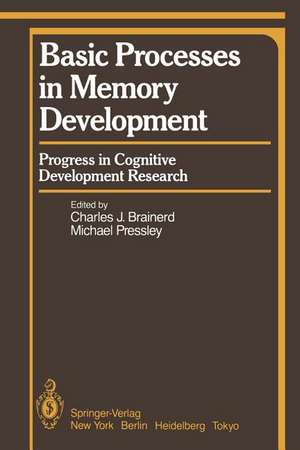Basic Processes in Memory Development: Progress in Cognitive Development Research: Springer Series in Cognitive Development
Editat de C. J. Brainerd, M. Pressleyen Limba Engleză Paperback – 12 dec 2011
Din seria Springer Series in Cognitive Development
-
 Preț: 382.75 lei
Preț: 382.75 lei -
 Preț: 388.90 lei
Preț: 388.90 lei -
 Preț: 386.61 lei
Preț: 386.61 lei -
 Preț: 383.93 lei
Preț: 383.93 lei - 18%
 Preț: 778.13 lei
Preț: 778.13 lei -
 Preț: 383.71 lei
Preț: 383.71 lei -
 Preț: 387.75 lei
Preț: 387.75 lei -
 Preț: 381.43 lei
Preț: 381.43 lei -
 Preț: 391.61 lei
Preț: 391.61 lei -
 Preț: 396.02 lei
Preț: 396.02 lei -
 Preț: 392.60 lei
Preț: 392.60 lei - 15%
 Preț: 635.80 lei
Preț: 635.80 lei -
 Preț: 382.75 lei
Preț: 382.75 lei -
 Preț: 384.86 lei
Preț: 384.86 lei -
 Preț: 388.90 lei
Preț: 388.90 lei - 5%
 Preț: 368.37 lei
Preț: 368.37 lei - 15%
 Preț: 592.29 lei
Preț: 592.29 lei -
 Preț: 386.81 lei
Preț: 386.81 lei
Preț: 371.30 lei
Preț vechi: 390.84 lei
-5% Nou
Puncte Express: 557
Preț estimativ în valută:
71.05€ • 74.38$ • 58.79£
71.05€ • 74.38$ • 58.79£
Carte tipărită la comandă
Livrare economică 07-21 aprilie
Preluare comenzi: 021 569.72.76
Specificații
ISBN-13: 9781461395430
ISBN-10: 1461395437
Pagini: 344
Ilustrații: XV, 324 p.
Dimensiuni: 155 x 235 x 18 mm
Greutate: 0.48 kg
Ediția:Softcover reprint of the original 1st ed. 1985
Editura: Springer
Colecția Springer
Seriile Springer Series in Cognitive Development, Progress in Cognitive Development Research
Locul publicării:New York, NY, United States
ISBN-10: 1461395437
Pagini: 344
Ilustrații: XV, 324 p.
Dimensiuni: 155 x 235 x 18 mm
Greutate: 0.48 kg
Ediția:Softcover reprint of the original 1st ed. 1985
Editura: Springer
Colecția Springer
Seriile Springer Series in Cognitive Development, Progress in Cognitive Development Research
Locul publicării:New York, NY, United States
Public țintă
ResearchCuprins
1 Children’s Retrieval Deficit.- Current Accounts of Children’s Retrieval Deficit.- Descriptions: A Model of Memory Retrieval.- The Research Program.- Constraints on Descriptive Power.- General Discussion.- References.- 2 From Cognitive to Procedural Mapping.- Proposition 1: The Study of Cognitive Mapping Is Now an Active Pluralistic Enterprise.- Proposition 2: The Cognitive Mapping Enterprise Has Tended to Operate on Its Own, in Relative Isolation From Other Relevant Research Domains.- Proposition 3: The Study of Cognition and Cognitive Development Is More Mature Than the Study of Cognitive Mapping.- Proposition 4: Spatial Representation Is Paradigmatic of Nonspatial Thought.- Proposition 5: The Cognitive Mapping Enterprise Can Profit From the Activities of Cognitive Psychology.- Proposition 6: Emotions Play a Significant Role in Both Spatial and Nonspatial Thought.- Proposition 7: Cognitive Processing Has a Heavier Emotional Component in Early Development.- Proposition 8: Emotional Agenda Have Greater Priority Than Cognitive Agenda Early in Development.- Epilogue: Cognitive Development Among Cognitive Mappers.- References.- 3 The Role of Conceptual Knowledge in the Development of Organization in Children’s Memory.- The Development of Conceptual Knowledge.- The Development of Organization in Children’s Memory.- References.- 4 Model-Based Approaches to Storage and Retrieval Development.- Why Models?.- A Short-Term Memory Model.- A Long-Term Memory Model.- A Retention Model.- Storage and Retrieval: The Developmental Picture.- References.- 5 Short-Term Memory Development in Childhood and Adolescence.- Theoretical Issues and Controversies.- The Development of Short-Term Memory.- Summary and Conclusions.- References.- 6 Interpretation of Response Time in Research onthe Development of Memory and Cognition.- Decomposing Reaction Times.- Growth Functions.- Practice.- The Speed-Accuracy Trade-Off.- Concluding Remarks.- References.- 7 Memory Methodology in Maturity.- Memory Classification Scheme.- Establishing Phenomena—Internal Validity.- The Question of Generalizability—External Validity.- Sampling Considerations—Subject Selection.- Conclusion.- References.- Author Index.














